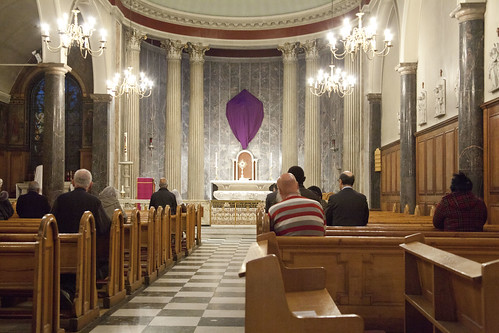...Monsignore Cesare Nosiglia, the Archbishop of Turin, Italy, for the most adulatory Ramadan or Eid-al-Fitr greeting card or letter ever published south of the Alps. Or north of them.
When sending greetings to members of another faith, there is courtesy and politeness, when circumstances absolutely demand the greeting. Then there is flattery. And then there is just plain sycophancy.
Islam is not a religion of "nice". Islam is a religion of Law and Power. Law, Polity, Faith are inseparable, and the faithful Muslim is (and in this he should be praised for acting upon what he wrongly believes) always seeking the accomplishment of the three realities in one, whenever circumstances allow them.
The following displaced Christian woman, interviewed by Assyrian-owned Ishtar TV this week shows this well. Remember that her family has been in what is now Northern Iraq forever, that there were Christians in her city of Mosul (Nineveh) certainly days or weeks after Pentecost, Jewish or Proselyte pilgrims who had been in Jerusalem for the Feast of Shavuot and, probably by way of Damascus, returned to their land filled with the Spirit and the Good News of the Resurrected Messiah. Then, six centuries later came the invading Arab hordes and, with time and pressure, and new populations, a Christian population became a Muslim-majority population.
Now, one can only imagine how many millions of times the lady and her ancestors had greetings of Muslim feasts for their neighbors. But, with the most brutal regime for centuries in town, most Muslims (not all, of course, but almost all, other than one or other heroic Muslim), sensing the times, turned on their Christian neighbors -- that is how centuries of polite greetings from Christians were returned: "Ordinary Muslim citizens are treating us like this in Mosul." Please, take a look -- she knows the Koran well, but that was not enough to save her family from expulsion and expropriation:
The members of the religion of Mohammed can sense more than any other adherent of any faith the weakness in others. It is not due to any inherent evil in them as human beings (they are as noble and precious and as unworthy of the redemption bought by the Blood of Our Lord Jesus Christ as any human being); it is, as we said above, the way the structure Polity-Law-Creed that is their faith functions. When they sense they can advance, they will. Therefore, a polite greeting can be interpreted as mere courtesy. But bishops in particular, who are the leaders of the Catholic faithful and who are, for this reason, usually treated as the political leaders of Christian minorities in Muslim lands (because that is the way Muslims view matters), must be careful not to send messages of lavish adulation, which are rightly interpreted by most Muslims as submission -- which is, after all, the very name of Islam.
So, yes, by all means, dear Lord Bishops, if you wish to be courteous, limit yourselves to greeting cards with a couple of words. More than that, and, even if you are not aware of it, you are calling for much, much more than you can handle.
______________________________
Published in Archdiocesan weekly “La Voce del Popolo” (The Voice of the People), edition of the upcoming Sunday, July 27, 2014, the letter of greetings from the Archbishop addressed to the Muslims resident in the territory of the diocese of Turin, on the occasion of the celebrations for the conclusion of the Ramadan fast at the end of July. The entire text is attached, as consigned in original copy to the Islamic cultural centers of Turin (with mosques attached) by the parish priests of the respective territorial areas.
Dear Muslim faithful
Today the month of fasting, characterized by your intense personal effort of great dedication to God and renewal of the faith concludes with the feast of “id ad fitr”
We hope, above all, that your obedience to the will of God is strengthened and that you have been filled with every virtue, as your famous medieval theologian affirms, Adu Hamid al-Ghazli: “Clothe yourselves again with the conduct of God[…]. The maximum perfection, for the believer, consists in getting closer to his Lord, making his own those attributes that merit every praise: science, justice, piety, goodness, benignity, beneficence, mercy, good counsel, encouragement in the good and protection from evil.”





























